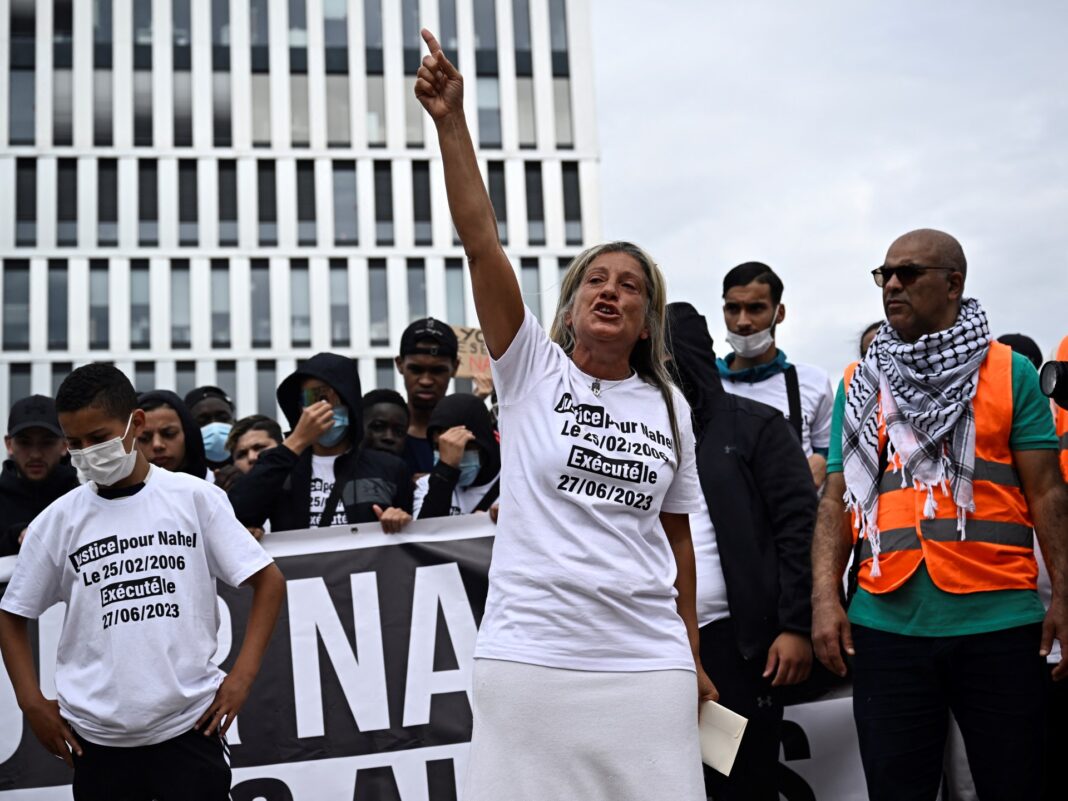Honourary rally comes a day before France heads to the polls in the first round of the snap elections with racism taking centrestage in the vote.
A year after a French teenager with North African roots was killed by a policeman, his mother led a march to pay homage to her son that ended at the scene where he was gunned down without provocation.
Several hundred family members, friends, and supporters gathered in the Paris suburb of Nanterre on Saturday to remember Nahel Merzouk, 17, who was shot dead at point-blank range by a police officer at a traffic stop on June 27, 2023 – a killing that sparked shock and days of rioting across France.
His mother, Mounia, spoke to the crowd, then broke away in tears. Friends wore white T-shirts with Merzouk’s photo and residents of his housing project held a banner reading “Justice for Nahel”.
The march ended at the spot where he was killed and an imam sang and read a prayer. While there was no visible police presence, organisers recruited guards to ensure security for the event.
The procession came at a politically fraught time when hate speech blights campaigning for snap parliamentary elections on Sunday. And when an anti-immigration party – that wants to boost police powers to use their weapons and has historical ties to racism and anti-Semitism – is leading in the polls.
Merzouk’s mother asked politicians to stay away from the march to avoid tensions. “I don’t have Nahel any more. I just want justice for my son,” she told the crowd.
Assa Traore, 39, who has fought for justice since her brother, Adama, died in police custody in 2016, said, “This march is a powerful symbol”.
“It means that history can’t write itself without us. We, from the working-class neighbourhoods, are the firsthand victims of these elections. We realised from an early stage the National Rally and far-right parties were a danger for our country and will weaken it,” said Traore, who has roots in Mali.
‘Racial profiling is our daily life’
Reporting from Naterre, Al Jazeera’s Berard Smith noted, “Nahel’s death fed a narrative that French police use excessive force and get away with it. The office of the UN Commissioner for Human Rights said the shooting was a ‘moment for the country to seriously address the deep issue of racism and racial discrimination in law enforcement’.”
On Sunday, French voters head to the polls in the first round of voting for the National Assembly, the lower house of parliament, which could lead to the country’s first far-right government since the World War II Nazi occupation.
Citing “security concerns”, notably in housing projects and other impoverished areas in French suburbs – or “banlieues” – the far-right National Rally (RN) party wants to give a specific new legal status to police.
If police officers use weapons during an intervention, they would be “presumed” to have acted in self-defence. Currently, police officers share the same legal status as all French citizens, and must prove they acted in self-defence after discharging a firearm.
Meanwhile, the left-wing coalition New Popular Front wants to ban the use of some police weapons and dismantle a notoriously violent police unit.
“People fear a victory of the RN party. People from working-class neighbourhoods are afraid every day that our sons, brothers, or husbands will be killed. Racism and racial profiling are our daily life,” Traore said.
‘Conflicting loyalties’
On Friday, the RN faced new accusations of racism with a senior parliamentarian declaring a former education minister of Moroccan descent should never have got the job because of her origins.
Lawmaker Roger Chudeau declared that Najat Vallaud-Belkacem’s appointment to the education portfolio in 2014 was “not a good thing” for France, saying her French and Moroccan citizenship meant she had “conflicting loyalties”.
The incidents have done little to dent the popularity of the National Rally, however.
Opinion polls suggest the RN party could dominate the next parliament after the July 7 second round of voting and secure the prime minister’s position. In that scenario, Macron would retain the presidency until 2027 but in a sharply weakened role.







